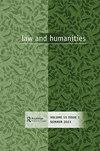无国籍社会中的法律:希腊文学中的替罪羊、诅咒者和惩罚者
IF 0.2
Q3 LAW
引用次数: 0
摘要
摘要:雷内·吉拉德,一位颇有影响力的牺牲和受害者理论家,将俄狄浦斯塑造成替罪羊,他吸收了困扰底比斯的“自由浮动”的罪恶感。但他是吗?吉拉德对替罪羊和对等暴力的定义是建立起来的,然后利用宙斯的法律和俄瑞斯忒亚的故事周期,将其与古希腊神话中无国籍社会的惩罚区分开来。在希腊,围绕男男孩性关系和恋童癖关系的实践和态度从神话时代演变为历史时代,得到了重建。莱厄斯、佩洛普斯、克里西普斯、俄狄浦斯和乔卡斯塔的更大故事是通过对已失传但已证实的戏剧的研究以及神话材料进行调查的。通过将莱厄斯对克里西普斯的非法绑架确立为有罪之源,并在历史性的雅典悲剧中对其进行处理,俄狄浦斯反而在一个无国籍但并非无法无天的社会中成为了一个不知情且不情愿的惩罚代理人。本文章由计算机程序翻译,如有差异,请以英文原文为准。
Law in stateless societies: scapegoats, curses and punishers in Greek literature
ABSTRACT Rene Girard, influential theorist of sacrifice and victimage, casts Oedipus as a scapegoat, who absorbs the ‘free-floating’ guilt that has plagued Thebes. But is he? Girard’s definitions of the scapegoat and reciprocal violence are established, and then differentiated from the administration of punishment in the stateless societies of ancient Greek myths, using the laws of Zeus and the story cycle of the Oresteia. Practices and attitudes surrounding man-boy sexual and pederastic relationships are reconstructed as they evolved from mythic into historic times in Greece. The larger story of Laius, Pelops, Chrysippus, Oedipus and Jocasta is investigated using scholarship on lost but attested plays as well as mythographic materials. By establishing Laius’s illicit abduction of Chrysippus as the source of guilt, and its treatment in tragedy in historic Athens, Oedipus emerges instead as an unwitting and unwilling agent of punishment in a stateless but not lawless society.
求助全文
通过发布文献求助,成功后即可免费获取论文全文。
去求助
来源期刊

Law and Humanities
LAW-
CiteScore
1.00
自引率
0.00%
发文量
21
期刊介绍:
Law and Humanities is a peer-reviewed journal, providing a forum for scholarly discourse within the arts and humanities around the subject of law. For this purpose, the arts and humanities disciplines are taken to include literature, history (including history of art), philosophy, theology, classics and the whole spectrum of performance and representational arts. The remit of the journal does not extend to consideration of the laws that regulate practical aspects of the arts and humanities (such as the law of intellectual property). Law and Humanities is principally concerned to engage with those aspects of human experience which are not empirically quantifiable or scientifically predictable. Each issue will carry four or five major articles of between 8,000 and 12,000 words each. The journal will also carry shorter papers (up to 4,000 words) sharing good practice in law and humanities education; reports of conferences; reviews of books, exhibitions, plays, concerts and other artistic publications.
 求助内容:
求助内容: 应助结果提醒方式:
应助结果提醒方式:


